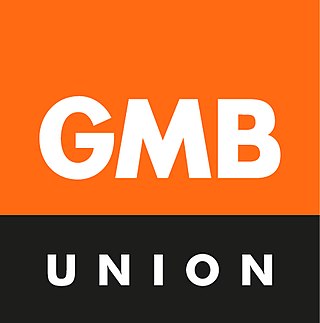
The GMB is a general trade union in the United Kingdom which has more than 560,000 members. Its members work in nearly all industrial sectors, in retail, security, schools, distribution, the utilities, social care, the National Health Service (NHS), ambulance service and local government.

Temporary work or temporary employment refers to an employment situation where the working arrangement is limited to a certain period of time based on the needs of the employing organization. Temporary employees are sometimes called "contractual", "seasonal", "interim", "casual staff", "outsourcing", "freelance"; or the words may be shortened to "temps". In some instances, temporary, highly skilled professionals refer to themselves as consultants. Increasingly, executive-level positions are also filled with interim executives or fractional executives.
Freelance, freelancer, or freelance worker, are terms commonly used for a person who is self-employed and not necessarily committed to a particular employer long-term. Freelance workers are sometimes represented by a company or a temporary agency that resells freelance labor to clients; others work independently or use professional associations or websites to get work.

Employment tribunals are tribunal public bodies in both England and Wales and Scotland that have statutory jurisdiction to hear disputes between employers and employees.
Misclassification of employees as independent contractors is the way in which the United States and other countries classify the problem of false self-employment. In the U.S., it can occur with respect to tax treatment or the Fair Labor Standards Act.
Maria Ludkin was a lawyer for the GMB Trade Union, the third biggest union in the United Kingdom. She speaks frequently in relation to prominent GMB campaigns. In particular some of the less well known impacts of private equity on the economy and employment, which led to the calling of Treasury Select Committee hearings, and in relation to redundancies at Marks and Spencer. She has been involved in major GMB campaigns regarding proposed Remploy closures, equal pay, the Swindon hospital workers dispute and construction industry blacklisting, where litigation led to historic compensation payments.

Sir Nicholas Edward Underhill, styled The Rt Hon. Lord Justice Underhill, is a British judge of the Court of Appeal of England and Wales.
Hermes Europe GmbH is a German delivery company headquartered in Hamburg, owned by the retail company Otto GmbH.
Deliveroo is a British online food delivery company founded by Will Shu and Greg Orlowski in 2013 in London, England. It operates in the United Kingdom, France, Belgium, Ireland, Italy, Singapore, Hong Kong, the United Arab Emirates, Kuwait, and Qatar. It formerly operated in Germany, Taiwan, Spain, the Netherlands, and Australia. Its subsidiary operation, Deliveroo Editions operates dark kitchens for the preparation of delivery-only meals.

William Shu is an American-British businessman, the co-founder and CEO of Deliveroo, an online food delivery company with operations spread across more than 200 cities in 11 countries.

Uber BV v Aslam [2021] UKSC 5 is a landmark case in UK labour law and company law on employment rights. The UK Supreme Court held the transport corporation, Uber, must pay its drivers the national living wage, and at least 28 days paid holidays, from the time that drivers log onto the Uber app, and are willing and able to work. The Supreme Court decision was unanimous, and upheld the Court of Appeal, Employment Appeal Tribunal, and Employment Tribunal. The Supreme Court, and all courts below, left open whether the drivers are also employees but indicated that the criteria for employment status was fulfilled, given Uber's control over drivers.

Gig workers are independent contractors, online platform workers, contract firm workers, on-call workers, and temporary workers. Gig workers enter into formal agreements with on-demand companies to provide services to the company's clients.

Shannon Liss-Riordan is an American labor attorney. She is best known for her class-action cases against companies such as Uber, FedEx, and Starbucks. Liss-Riordan was a candidate in the 2020 United States Senate election in Massachusetts, unsuccessfully challenging incumbent Ed Markey for his senate seat.

CitySprint is a courier and logistics company based in the UK. The company operates the brands On the dot, CitySprint Health, CitySprint Office, Transworld and CityBags.
California Assembly Bill 5 or AB 5 is a state statute that expands a landmark Supreme Court of California case from 2018, Dynamex Operations West, Inc. v. Superior Court ("Dynamex"). In that case, the court held that most wage-earning workers are employees and ought to be classified as such, and that the burden of proof for classifying individuals as independent contractors belongs to the hiring entity. AB 5 extends that decision to all workers. It entitles them to be classified as employees with the usual labor protections, such as minimum wage laws, sick leave, and unemployment and workers' compensation benefits, which do not apply to independent contractors. Concerns over employee misclassification, especially in the gig economy, drove support for the bill, but it remains divisive.

Proposition 22 was a ballot initiative in California that became law after the November 2020 state election, passing with 59% of the vote and granting app-based transportation and delivery companies an exception to Assembly Bill 5 by classifying their drivers as "independent contractors", rather than "employees". The law exempts employers from providing the full suite of mandated employee benefits while instead giving drivers new protections:

Hollis v Vabu Pty Ltd (Vabu) was a decision of the High Court of Australia. It is a notable decision in Australian employment law.
Independent Workers of Great Britain Union v Central Arbitration Committee [2023] UKSC 43 is a UK labour law case, concerning sham self-employment and the human right to unionise and collectively bargain.
The International Alliance of App-based Transport Workers (IAATW) is a network of trade unions organizing ridesharing and other gig transport workers.












